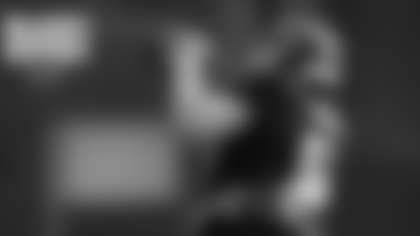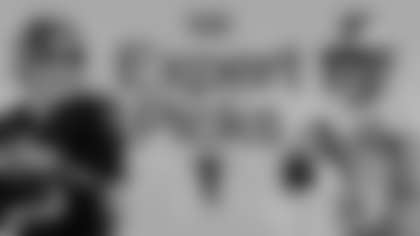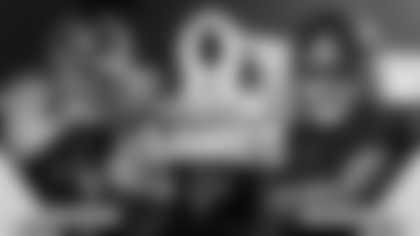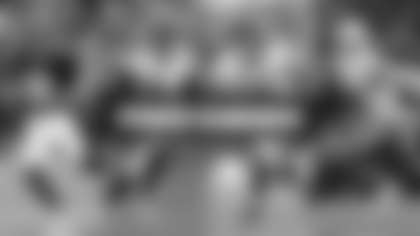The 1991 Atlanta Falcons remain one of the most notorious teams in NFL history. With big personalities, a high-flying offense and a prime-time defense, there was plenty to love or hate about the "Too Legit to Quit" Falcons.
But regardless of a person's opinion of them off the field – this team didn't seem to care about those opinions – their on-field play could not be denied. Led by coach Jerry Glanville, star cornerback Deion Sanders and quarterback Chris Miller, the 1991 Falcons became the first Atlanta team to reach the playoffs in nearly a decade.
This isn't a story about how the Falcons reached the playoffs, though. This is a story about what they did when they got there.
This is a story about how the Falcons marched into New Orleans and left with a 27-20 victory, knocking their most hated rival out of the playoffs in their only postseason meeting.
Chapter 1: An exciting culture. An exciting team.
Chris Miller (quarterback): When I first signed with Atlanta it was the strike year of 1987. I signed on Halloween, and I think the team was 2-7 when I signed. And they had had three winning seasons in 23 years at that point in 1987, so there wasn't that much excitement around the organization. When Jerry came in, he brought a lot of fanfare, brought a lot of bells and whistles. The "Back in Black," and James Dean and Elvis Presley, all of his stuff he did. We needed that, man. We needed a boost, we needed some excitement and he brought it.
Jerry Glanville (coach): We always tried to have fun, that was what we were doing. But those players knew these celebrities, I didn't know them. I think Deion knew MC Hammer and wanted to know if he could have Hammer on the sideline. Somebody else knew this guy and somebody else knew that guy, and it just grew into a very exciting and fun time.
Miller: And that matched his personality. He was a tough competitor. Good football coach too – good special teams coach, good defensive coach. So, after the first year I think we were 5-11 but we had some really close games. We felt confident that we were close to kind of turning the corner, so '91 was a pivotal season in that organization's history.

Glanville: They loved to play. They loved to play, they loved to compete, to hit people. And we had fun. We weren't afraid to laugh. If you wanted to play your music in the locker room, we played music. We didn't worry about all of those rules. It was an unusual group.
Miller: I remember in the preseason we went down to Fat Tuesdays down in Buckhead and we all got faded. We went out, he took a couple of buses downtown, and I think on one of the buses a couple dudes went at it and drew blood. Jerry loved it and encouraged that. He would yell something like, 'Hey, fight on Bus 2!' We kind of missed the bus back on purpose, and we didn't make it back until early in the morning. And we didn't get reprimanded at all, I think Jerry kind of laughed at it.
Michael Haynes (receiver): We traveled with MC Hammer, Evander Holyfield and all of those guys. They traveled with us like they were a part of the team. And we accepted them like that.
Miller: He let the guys kind of be themselves. And it permeated through the town, through the city, through the team. It was just a fun environment, fun to go to work every day. Game days were awesome, I think we won nine of our last 10 regular season games. It was a good time, man.

Glanville: That team was beloved and still loved. When I go back to Atlanta, they had me there last year and honored me at halftime, every single person said, "You're still our coach." They said, "That's our coach, he'll always be our coach." And then the NFL then honored the '91 team as the most exciting team in the history of the league. And that's a team that didn't even go to the Super Bowl.
Chapter 2: A high-intensity rivalry with even higher stakes
Haynes: It was my first time being in the playoffs. We were battling against New Orleans for the conference championship, and they ended up winning it because we lost our last game of the season to Dallas. If we'd have won that game, we would have hosted the playoff game. And because we lost that game we ended up going on the road down to New Orleans, which was our third time playing them that season.
New Orleans is one of our hated rivalries and it just so happened to be my hometown, so I was really stoked about the game. Having my first playoff game be down in my hometown, against my hometown team. I was really excited about the game.
Miller: They were a great football team, man. Their defense was nasty. I still remember I played with four of their linebackers in the Pro Bowl in '92: Sam Mills, Vaughan Johnson, Rickey Jackson and Pat Swilling. And then they had Jumpy Geathers and Frank Warren. They were an intimidating defense and a very good defense. Every time we played against them we knew it was going to be a physical game and a tough competition. The fact that this was a playoff game at their place, the stakes were even higher.

Glanville: It's kind of funny, because I was there in the '70s with the rivalry also. It seemed as though the home team never won the game. If you go back and look at the rivalry, how did the visiting team always come in and win? And if we'd have beaten Dallas in the last game of the season, Dallas had 12 wins and we had 11, I wonder where we would have gone and how the playoffs would have changed? Would we be the home team and who would we have been playing?
Haynes: I remember back in the late '80s, early '90s, New Orleans used to travel. They'd bring thousands of people to come to our stadium and party like it was their stadium. And that made it worse for us on the field. We were mad about that. And then we'd travel down to Louisiana and we'd bring thousands of fans with us too. I guess because it's such a close rivalry, proximity-wise, that just made it a huge one. I always enjoyed playing in those games.
Miller: I grew up watching the Atlanta Falcons. I was a huge sports fan back in the day, and we got a lot of the Atlanta games on WTBS. So, I would watch Steve Bartkowski play. I was a Rams fan, so I would watch a lot of the NFC West games and Archie Manning in New Orleans. So I knew of the rivalry. And then being in it was so intense because of the rivalry of Atlanta versus the people of New Orleans. They were the Who Dats and we were the crazy team from Atlanta. We went at it man, there was no love lost and it was intense.
Haynes: It meant a lot. No matter what the records are for each team, we could have been 3-10 and they could have been 10-3, it's always the toughest game of the season every time we play them. It's always the toughest game, and it can turn out either way.
Miller: We had a terrific defense. They did a good job of keeping us in the game. And I think New Orleans' offense wasn't real prolific, either. They kind of played a possession-style offense and tried to win games with defense and Morten Andersen. They had a good quarterback, Bobby Hebert, a good running back and good receivers. They were just a tough, hard-nosed, physical group. To go in there and go in their house where it was even more intense – I never audibled there in the seven years I played there, it was so loud.

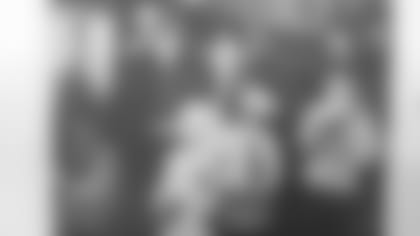
Glanville: Going into New Orleans we always treated it, until the game was over, as a business trip. Nobody went down Bourbon Street, nobody did this, nobody did that. They were a group that was serious about their craft. I never had to worry about someone breaking a curfew, I never had a guy that was violating a rule on the road. We went in and went to work and then partied afterwards.
Chapter 3: A back-and-forth game that ended in silence
The Saints built a quick 10-0 lead before the Falcons rallied back to cut their deficit to 13-10 heading into halftime. There were three lead changes in the second half, but the final lead change came on a game-winning 61-yard touchdown pass from Miller to Haynes, which left the home crowd in stunned silence.
Glanville: I think we got behind by 10 points. I remember us getting behind and nobody got worried because it was a group that just kept playing. Nobody really looked at the scoreboard.
Haynes: I remember catching my first touchdown and getting hit, and I cracked two ribs on it. So I kind of sat out a lot of the third quarter. If you look at the first touchdown, Vencie Glenn hit me, and the first thing that hit the ground was my head. I got up and I remember spiking the ball, and I knew immediately something was wrong. I was like, "Oh my goodness, something is wrong."
Miller: We just kind of stayed the course. Jerry Glanville's mentality was fiery, and June Jones', our offensive coordinator's, mentality was, "Hey, man, let's just keep plugging."
Haynes: There was a lot of back-and-forth. It wasn't like we scored a scored a lot of points and then they came back, it was just back-and-forth the whole time. There were turnovers in the game that made it critical. Each one of us were just fighting for our playoff lives, because the winner goes on and the loser, that's it, you go home.
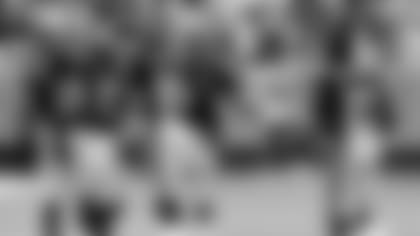
Miller: So, we stayed the course and kept plugging and kept working at it and things turned our way. We had the big-play capability with Andre Rison and Michael Haynes, obviously. That lends itself well to get back into the game.
Haynes: I came back in the game, because it was a playoff game. I had to play. Came back in the game and ended up catching the winning touchdown. Actually, it was a catch-and-run.
Glanville: That's a play we practiced every week. It's a play that we not only did in Atlanta, but we were very successful running with the Houston Oilers. We said, "Let's crank it up." We cranked it up and threw it, and lo and behold we caught it. It was a beautiful thing.
Miller: Yeah, a little hitch route versus blitz zero, and he took it to the house. Made me look good – short throw, long run.
Glanville: People have no idea how fast Michael was. Michael Haynes could run away from people.
Haynes: I was kind of scared because I had two cracked ribs.
Glanville: The Saints were then trying to come back, and they were trying to get in close and the guy ran a 22-yard dig. And [safety] Tracy Eaton hit the guy so hard it crushed his own [helmet] cage onto his face. We could not get Eaton's helmet off until we got a drill and took off his cage. If his cage was crushed on his face, you can imagine how that poor receiver felt. Our guy hit the Saints receiver so hard, I've never seen anything like it.
And we all were in the locker room celebrating the win and Eaton came to me and he said, "Coach, coach, I can't get my helmet off." Well his cage was flat on his face. We had to go get the equipment manager to get a drill, and we had to take out all of the screws on the cage so we could take his helmet off. That's the way they played.
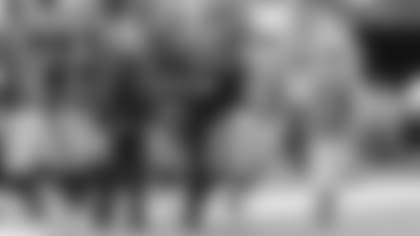
The Saints' last-gasp effort ended after Tim McKyer intercepted Hebert's pass. Rather than going down to win the game, McKyer lateralled the ball to Sanders, who again lateraled the ball to defensive back Joe Fishback who ran into the end zone. The touchdown was called back, as Sanders' lateral was ruled a forward pass, but the statement was made: This team didn't compromise its style.
Glanville: They were trying to come back, and I remember we intercepted a pass on the last drive and we lateraled the pass three times. We picked it off, and I think the clock went out, but we were trying to score with it anyway. The fact that they brought it back didn't matter, the game was over anyway.
Miller: We took what we practiced to the games and, again, Jerry encouraged that. It fit Prime Time's personality, and Tim McKyer was squirrely as the day is long, he was a goofy cat, so he was involved in on it. It was kind of apropos, a fitting ending for that game, that we had the game won and if they simply fall down we run out the clock. But they were pissing it around, looking for Prime, and there was a forward lateral I remember. But it was totally fitting for the style of defense we played and our personality.
Dan Dierdorf on the TV broadcast: On two of the stupidest plays I've seen in a long time. I don't mean to be critical but all he's got to do is fall on the ball and the game is over. They take two chances like that and end up scoring a touchdown. That's not smart, guys. That's not smart. But the Falcons win the ball game.
Haynes: It's funny, people say we should have just knelt on the ball or we should have downed it because the game was already over then. But that's not the style of ball we played. We were just out there trying to have fun and going for it every time. I'm sitting on the sideline, halfway dazed, and the game's almost over and we're lateraling the ball. I'm just like, "Man." I think it was Joe Fishback who ran the ball into the end zone, and the crowd was just silent. There's nothing like being in the opposing stadium and the crowd is just silent. That is the absolute best feeling in the world.


